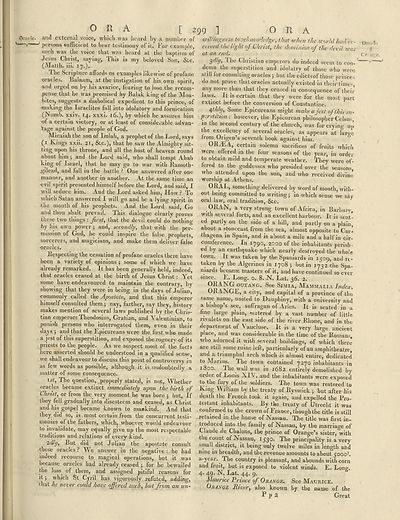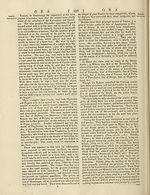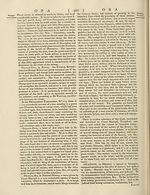Encyclopaedia Britannica > Volume 15, NIC-PAR
(349) Page 299
Download files
Complete book:
Individual page:
Thumbnail gallery: Grid view | List view

o n a
Oracle.
find external voice, which was heard by a number of
J persons sufficient to hear testimony of it. For example,
such was the voice that was heard at the baptism of
Jesus Christ, saying, This is my beloved Son, &c.
(Matth. iii. 17.).
1 he Scripture affords us examples likewise of profane
oracles. Balaam,, at the instigation of Ins own spirit,
and urged on by his avarice, fearing to lose the recom¬
pense that he was promised by Balak king of the Moa¬
bites, suggests a diabolical expedient to this prince, of
making the Israelites fall into ulolatory and fornication
(Numb, xxiv, 14. xxxi. 16.), by which he assures him
of a certain victory, or at least of considerable advan¬
tage against the jieople of God.
Micaiah the son of Imlah, a prophet of the Lord, says
(1 Kings xxii. 21, &c.), that he saw the Almighty sit¬
ting upon his throne, and all the host of heaven round
about him ; and the Lord said, who shall tempt Ahab
king of Israel, that he may go to war with Ramoth-
gtlead, and fall in the battle ? One answered after one
manner, and another in another. At the same time an
evil spirit presented himself before the Lord, and said, I
will seduce him. And the Lord asked him, How ? To
which Satan answered I will go and be a lying spirit in
the mouth of his prophets. And the Lord said, Go
and thou shall prevail. This dialogue clearly proves
these two things : first, that the devil could do nothing
by his own power; and, secondly, that with the per¬
mission of God, he could inspire the false prophets,
sorcerers, and magicians, and make them deliver false
oracles.
Respecting the cessation of profane oracles there have
been a variety of opinions; some of which we have
already remarked. It has been generally held, indeed,
that oracles ceased at the birth of Jesus Christ : Yet
some have endeavoured to maintain the contrary, by
showing that they were in being in the days of Julian,
commonly called the Apostate, and that this emperor
himself consulted them ; nay, farther, say they, history
makes mention of several laws published by the Chris¬
tian emperors Theodosius, Gratian, and Valentinian, to
punish persons who interrogated them, even in their
days ; and that the Epicureans were the first who made
a jest of this superstition, and exposed the roguerv of its
priests to the people. As we suspect most of the facts
here asserted should be understood in a qualified sense,
we shall endeavour to discuss this point of controversy in
as few words as possible, although it is undoubtedly a
matter of some consequence.
isf, The question, properly stated, is not, Whether
[ 299 ]
O It A
willingness to acknowledge, that when the world hud re¬
ceived the light oj Christ, the dominion oj the devil was
at an end.
$dly, I lie Christian emperors do indeed seem to con¬
demn the superstition and idolatry of those who were
still for consulting oracles ; but the edictsof those princes
do not prove that oracles actually existed in their times,
any more than that they ceased in consequence of their
laws. It is certain that they were for the most part
extinct before the conversion of Constantine.
4f/dl/, Some Epicureans might make a jest of this su¬
perstition: however, the Epicurean philosopher Celsus,
m d16 second century of the church, was for crying up
the excellency of several oracles, as appears at large
irom Origen’s seventh book against him.
OR/EA, certain solemn sacrifices of fruits which
were offered in the four seasons of the year, in order
to obtain mild and temperate weather. They were of¬
fered to the goddesses who presided over the seasons,
who attended upon the sun, and who received divine
worship at Athens.
ORAL, something delivered by word of mouth, with¬
out being committed to writing; in which sense we say
oral law, oral tradition, &e. 7
ORAN, a very strong town of Africa, in Barbarv,
with several forts, and an excellent harbour. It is seat¬
ed partly on the side of a hill, and partly on a plain,
about a stouecast from the sea, almost opposite to Car-*
thagena in Spain, and is about a mile and a half in cir¬
cumference. In 1790, 2000 of the inhabitants perish¬
ed by an earthquake which nearly destroyed the whole
town. It was taken by the Spaniards in 1509, and re¬
taken by the Algerines in 1708 ; but in 1732 the Spa¬
niards became masters of it, and have continued so ever
since. E. Long. o. 8. N. LaU 36. 2.
ORANG outang. See Sjmia, Mammalia Index.
ORANGE, a city, and capital of a province of the
same name, united to Hauphiny, with a university and
a bishop’s see, suffragan of Arles. It is seated in a
fine large plain, watered by a vast number of little
rivulets on the east side of the river Rhone, and in the
department of Vaucluse. It is a very large ancient
place, and was considerable in the time of the Romans,
who adorned it with several buildings, of which there
are still some ruins left, particularly of an amphitheatre,
and a triumphal arch which is almost entire, dedicated
to Marius. The town contained 7270 inhabitants in
1800. The wall was in 1682 entirely demolished by
order of Louis XIV . and the inhabitants were exposed
to the fury of the soldiers. The town was restored to
oracles became extinct immediately upon the birth of King William by the treaty of Ryswiok ; buCafter his
Christ, or from the very moment he was born ; but, If death the French took it again, and expelled the Pro-
they feU gradually into disesteem and ceased, as Christ testant inhabitants. By the treaty of Utrecht it was
and his gospel became known to mankind. And that confirmed to the crown of France, though the title is still
they did so, is most certain .from the concurrent testi- retained in the house of Nassau. The title was first in-
tiouuced into the family of Nassau, by the marriage of
Claude de Chalons, the prince of Orange’s sister, with
■the count of Nassau, 1530. The principality is a very
small district, it being only twelve miles in length and
nine in breadth, and tlie revenue amounts to about 3000!.
a-year.. The country is pleasant, and abounds with corn
and fruit, but is exposed to violent winds. E. Long.
4. 49. N. Lat. 44. 9.
Maurice Prince of Orange. See Maurice.
Orange River, also known by the name of the
P p 2 Great
monies of the fathers, which, whoever would endeavour
to invalidate, may equally give up the most respectable
traditions and relations of every kind.
idly, But did not Julian the apostate consult
these oracles ? Wre answer in the negative : he had
indeed recourse to magical operations, but it was
because oracles had already ceased ; for he bewailed
the loss of them, and assigned pitiful reasons for
it; which St Cyril has vigorously, refuted, adding,
that he never could have offered such, hut from an un~
Oriu-fo
!l
Cr;:i):rc,
Oracle.
find external voice, which was heard by a number of
J persons sufficient to hear testimony of it. For example,
such was the voice that was heard at the baptism of
Jesus Christ, saying, This is my beloved Son, &c.
(Matth. iii. 17.).
1 he Scripture affords us examples likewise of profane
oracles. Balaam,, at the instigation of Ins own spirit,
and urged on by his avarice, fearing to lose the recom¬
pense that he was promised by Balak king of the Moa¬
bites, suggests a diabolical expedient to this prince, of
making the Israelites fall into ulolatory and fornication
(Numb, xxiv, 14. xxxi. 16.), by which he assures him
of a certain victory, or at least of considerable advan¬
tage against the jieople of God.
Micaiah the son of Imlah, a prophet of the Lord, says
(1 Kings xxii. 21, &c.), that he saw the Almighty sit¬
ting upon his throne, and all the host of heaven round
about him ; and the Lord said, who shall tempt Ahab
king of Israel, that he may go to war with Ramoth-
gtlead, and fall in the battle ? One answered after one
manner, and another in another. At the same time an
evil spirit presented himself before the Lord, and said, I
will seduce him. And the Lord asked him, How ? To
which Satan answered I will go and be a lying spirit in
the mouth of his prophets. And the Lord said, Go
and thou shall prevail. This dialogue clearly proves
these two things : first, that the devil could do nothing
by his own power; and, secondly, that with the per¬
mission of God, he could inspire the false prophets,
sorcerers, and magicians, and make them deliver false
oracles.
Respecting the cessation of profane oracles there have
been a variety of opinions; some of which we have
already remarked. It has been generally held, indeed,
that oracles ceased at the birth of Jesus Christ : Yet
some have endeavoured to maintain the contrary, by
showing that they were in being in the days of Julian,
commonly called the Apostate, and that this emperor
himself consulted them ; nay, farther, say they, history
makes mention of several laws published by the Chris¬
tian emperors Theodosius, Gratian, and Valentinian, to
punish persons who interrogated them, even in their
days ; and that the Epicureans were the first who made
a jest of this superstition, and exposed the roguerv of its
priests to the people. As we suspect most of the facts
here asserted should be understood in a qualified sense,
we shall endeavour to discuss this point of controversy in
as few words as possible, although it is undoubtedly a
matter of some consequence.
isf, The question, properly stated, is not, Whether
[ 299 ]
O It A
willingness to acknowledge, that when the world hud re¬
ceived the light oj Christ, the dominion oj the devil was
at an end.
$dly, I lie Christian emperors do indeed seem to con¬
demn the superstition and idolatry of those who were
still for consulting oracles ; but the edictsof those princes
do not prove that oracles actually existed in their times,
any more than that they ceased in consequence of their
laws. It is certain that they were for the most part
extinct before the conversion of Constantine.
4f/dl/, Some Epicureans might make a jest of this su¬
perstition: however, the Epicurean philosopher Celsus,
m d16 second century of the church, was for crying up
the excellency of several oracles, as appears at large
irom Origen’s seventh book against him.
OR/EA, certain solemn sacrifices of fruits which
were offered in the four seasons of the year, in order
to obtain mild and temperate weather. They were of¬
fered to the goddesses who presided over the seasons,
who attended upon the sun, and who received divine
worship at Athens.
ORAL, something delivered by word of mouth, with¬
out being committed to writing; in which sense we say
oral law, oral tradition, &e. 7
ORAN, a very strong town of Africa, in Barbarv,
with several forts, and an excellent harbour. It is seat¬
ed partly on the side of a hill, and partly on a plain,
about a stouecast from the sea, almost opposite to Car-*
thagena in Spain, and is about a mile and a half in cir¬
cumference. In 1790, 2000 of the inhabitants perish¬
ed by an earthquake which nearly destroyed the whole
town. It was taken by the Spaniards in 1509, and re¬
taken by the Algerines in 1708 ; but in 1732 the Spa¬
niards became masters of it, and have continued so ever
since. E. Long. o. 8. N. LaU 36. 2.
ORANG outang. See Sjmia, Mammalia Index.
ORANGE, a city, and capital of a province of the
same name, united to Hauphiny, with a university and
a bishop’s see, suffragan of Arles. It is seated in a
fine large plain, watered by a vast number of little
rivulets on the east side of the river Rhone, and in the
department of Vaucluse. It is a very large ancient
place, and was considerable in the time of the Romans,
who adorned it with several buildings, of which there
are still some ruins left, particularly of an amphitheatre,
and a triumphal arch which is almost entire, dedicated
to Marius. The town contained 7270 inhabitants in
1800. The wall was in 1682 entirely demolished by
order of Louis XIV . and the inhabitants were exposed
to the fury of the soldiers. The town was restored to
oracles became extinct immediately upon the birth of King William by the treaty of Ryswiok ; buCafter his
Christ, or from the very moment he was born ; but, If death the French took it again, and expelled the Pro-
they feU gradually into disesteem and ceased, as Christ testant inhabitants. By the treaty of Utrecht it was
and his gospel became known to mankind. And that confirmed to the crown of France, though the title is still
they did so, is most certain .from the concurrent testi- retained in the house of Nassau. The title was first in-
tiouuced into the family of Nassau, by the marriage of
Claude de Chalons, the prince of Orange’s sister, with
■the count of Nassau, 1530. The principality is a very
small district, it being only twelve miles in length and
nine in breadth, and tlie revenue amounts to about 3000!.
a-year.. The country is pleasant, and abounds with corn
and fruit, but is exposed to violent winds. E. Long.
4. 49. N. Lat. 44. 9.
Maurice Prince of Orange. See Maurice.
Orange River, also known by the name of the
P p 2 Great
monies of the fathers, which, whoever would endeavour
to invalidate, may equally give up the most respectable
traditions and relations of every kind.
idly, But did not Julian the apostate consult
these oracles ? Wre answer in the negative : he had
indeed recourse to magical operations, but it was
because oracles had already ceased ; for he bewailed
the loss of them, and assigned pitiful reasons for
it; which St Cyril has vigorously, refuted, adding,
that he never could have offered such, hut from an un~
Oriu-fo
!l
Cr;:i):rc,
Set display mode to:
![]() Universal Viewer |
Universal Viewer | ![]() Mirador |
Large image | Transcription
Mirador |
Large image | Transcription
Images and transcriptions on this page, including medium image downloads, may be used under the Creative Commons Attribution 4.0 International Licence unless otherwise stated. ![]()
| Encyclopaedia Britannica > Encyclopaedia Britannica > Volume 15, NIC-PAR > (349) Page 299 |
|---|
| Permanent URL | https://digital.nls.uk/192586235 |
|---|
| Attribution and copyright: |
|
|---|
| Shelfmark | EB.11 |
|---|---|
| Description | Ten editions of 'Encyclopaedia Britannica', issued from 1768-1903, in 231 volumes. Originally issued in 100 weekly parts (3 volumes) between 1768 and 1771 by publishers: Colin Macfarquhar and Andrew Bell (Edinburgh); editor: William Smellie: engraver: Andrew Bell. Expanded editions in the 19th century featured more volumes and contributions from leading experts in their fields. Managed and published in Edinburgh up to the 9th edition (25 volumes, from 1875-1889); the 10th edition (1902-1903) re-issued the 9th edition, with 11 supplementary volumes. |
|---|---|
| Additional NLS resources: |
|

